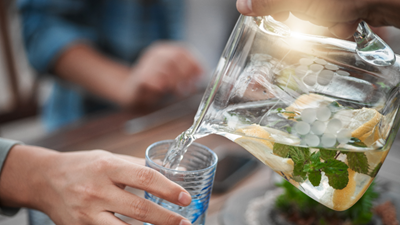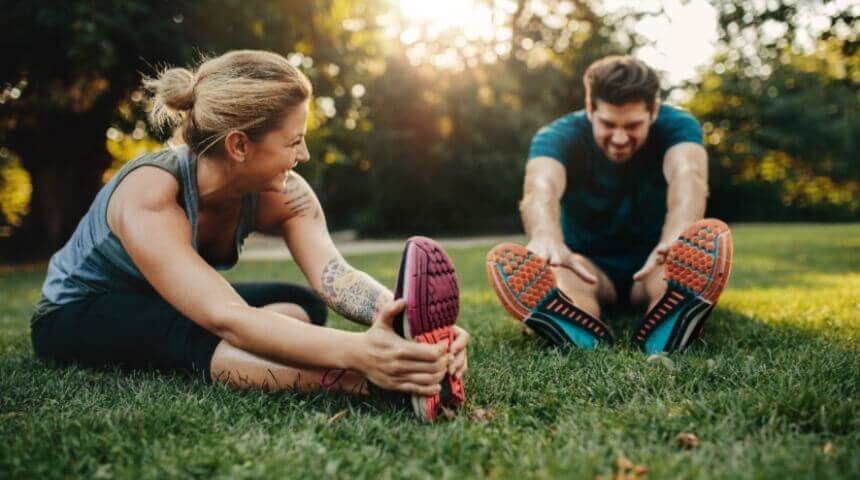Summer is a prime time for becoming dehydrated. Warmer weather, increased activity, and so many food occasions featuring alcohol can leave our bodies craving water.
Our bodies are made up of 60 percent water, with the brain and heart composed of 73 percent water, the lungs containing 83 percent, the skin containing 64 percent and the muscles and kidneys containing 79 percent. Even bones contain 31 percent water.
Water helps the body manufacture hormones and neurotransmitters, helps the cells grow and reproduce, flushes body waste, lubricates joints, aids in digestion through saliva, and helps regulate body temperature.
Even slight dehydration (a loss of 1-3 percent of body weight in water) can affect how well the body functions, causing changes in mood, memory and attention. More severe dehydration can cause changes in heart rate, blood pressure, and body temperature, and lead to hyperthermia or heat stroke.
In addition to negating the effects of dehydration, drinking enough water helps your energy level, prevents headaches, relieves constipation, treats kidney stones, prevents hangovers and helps with weight loss.
How Much Should You Drink to Stay Hydrated?
Dehydration can creep up on you, so it’s important to make a conscious effort to drink water year-round, and especially in the summer. The body loses water through breathing, coughing, sneezing and perspiration. Even if you’re not sweating profusely, your body is still losing water to regulate its temperature.
The general rule of thumb is to drink eight 8-ounce glasses of water a day, but that may vary depending on your level of physical activity, size, health and climate. The more active you are, the more water you should drink. Also, the warmer it is, the more you should drink, since your body will use more water to perspire.
It is possible to drink too much water, leading to a condition called hyponatremia. However, this condition is seen primarily with endurance athletes. In general, a non-athlete would not need to drink more than 100 ounces of water per day to stay hydrated.
What Should You Drink to Stay Hydrated?
Water is usually the best drink to keep your body functioning at its best. If you’re intensely active for more than 60 minutes, a sports drink that replaces electrolytes, carbohydrates and fluids lost during exercise could also be beneficial. For less intense exercise, sports drinks add unnecessary sugar and calories.
Some drinks, like coffee, alcohol and juices, are less effective for hydration than water. Caffeine is a diuretic and will cause the kidneys to create more urine. Alcohol can be dehydrating, and while juices may not have a diuretic effect, the calories and sugar they contain, particularly for those who are weight conscious or diabetic, make this a suboptimal choice for regular hydration.
Additional Benefit of Water
For those looking to lose weight, water can help. Drinking one to two glasses before meals can make you feel full sooner, so you consume less food. And, since you often feel hungry when you’re really thirsty, drinking water first can be an effective way to decrease unnecessary calories.
5 Easy Ways to Increase Your Water Consumption
- Find a water bottle that keeps your water ice cold and take it with you
- Use an app that reminds you to drink and that tracks your progress throughout the day
- Drink a glass of water for every other drink you order at a restaurant
- Jazz up your water flavor with fruit or vegetable slices
- Alternate your water with sparkling water
We Build Relationships
We believe that maintaining a healthy lifestyle is the key to living a longer, healthier life. Orlando Health Physicians strive to build a relationship with each patient. Request an appointment with one of our primary care physicians with offices located throughout Central Florida.
Schedule an Appointment










